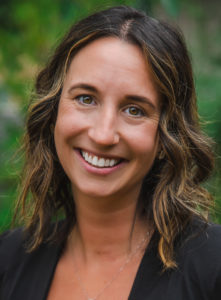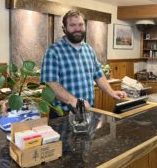
By GARRET JAROS/YachatsNews
YACHATS – The city of Yachats has decided to tap the brakes on increasing its lodging tax until figuring out how it might spend the additional revenue.
City manager Bobbi Price advised the city council at its Dec. 20 meeting to hold off on an increase because the city is already sitting on hefty reserves and unused lodging tax dollars with no firm plans yet how to spend them.
The city’s 9 percent transient rental tax is the city’s biggest source of revenue – bringing in $1.4 million during fiscal 2022-23.
During an early December work session, mayor Craig Berdie suggested that because voters in November approved Lincoln County raising its lodging tax from 10 percent to 12 percent, that Yachats might want to follow suit. The county is required by its charter to ask voters to raise its lodging taxes. Cities do not have to seek voter permission.
The work session ended with council asking city staff to run the numbers on how much increasing the tax by 1, 2 and 3 percentage points would add to the city’s coffers.
There are seven motels in Yachats and the city can license up to 125 vacation rentals. Motels provide 78 percent of Yachats’ lodging taxes and vacation rentals 22 percent. Lodging taxes are currently divided how they are spent — with 61 percent going into the city’s general operating fund and 39 percent going into a visitor amenities fund that must be used for projects that benefit tourism.
Last week, Price told the council that for every 1 percentage point increase, the tax would bring in approximately $150,000 in additional funds over 18 months. The split between funds however, will change, with 30 percent of the new, additional tax going into the general fund and 70 percent into the restricted visitor amenities fund.
Price said an increase to 12 percent for fiscal 2023-24 would add nearly $321,000 to the restricted fund and $137,532 to the general fund.

“My ultimate recommendation is that we continue looking at how we spend that restricted amount of money before jumping to make the raise,” Price said. “And really have a plan for it, and make sure that that plan for how that’s going to be spent is in accordance with the state laws.
“And we do have a healthy amount right now for visitor amenities with only a few ways that we’re spending it, so I would be hesitant to just jump into raising a tax because other people are raising the tax, without having a plan.”
The council agreed that it was important to delve further into how the funds can be spent and asked Price to take the lead in looking into it.
While the city has millions in unspent capital reserves, Berdie said the reason there is money available is because the city has not been using that money on long-awaited projects. Building something as simple as public restrooms would eat it up pretty quickly, he said.
Motels push back
The council last week didn’t have to wait long to hear opposition to the idea of raising taxes.
Drew Roslund, the managing partner of the Overleaf Lodge & Spa and Fireside Motel, faulted the rational of raising the tax just because the county and other nearby towns collect a higher rate.
While the county, Lincoln City, Newport, and Depoe Bay have a 12 percent rate, Roslund said, others like Florence, Cannon Beach, Manzanita, Bandon and Coos Bay are below 10 percent. He also asked councilors to consider that visitors and locals are also hit with a 5 percent tax on prepared food and beverages.

Yachats’ property taxes are so low – Roslund said his residential tax to the city this November was $74 – that someone staying four nights in a $207 oceanfront room pays more than that in lodging taxes during their stay.
That along with the local food and beverage tax eliminates any competitive advantage the city’s current 9 percent tax offers, he said, adding that it also takes money from the private sector and gives it to the government.
“I know that government feeds it back out for projects and so on that support the local area,” Roslund said. “But that’s taking ($1.4) million out of the local business economy. I would counter that a fair share of that could be used to upgrade hotel rooms, have a massage, purchase shirts or other items at local gift shops, buy appetizers or desserts … or purchase lattes and mochas instead of a cup of coffee.”
Roslund closed by encouraging the council to take Price’s suggestion to look into how the city planned to spend any additional tax revenue and how they could better support the businesses that bring in that revenue.
“Basically, I guess what I’m saying here is ‘Help us help you’,” he said. “The more help we can get the more TRT you’re going to get and it’ll continue to grow without having to increase the rate.”
Adobe Resort general manager Anthony Muirhead echoed Roslund’s comments.
The Adobe’s new owner has a mortgage to pay and investors to satisfy, Muirhead said, so if any additional taxes cut into its bottom line – it could well lead to room rates being cut in order to meet occupancy goals, which in turn could result in staff not getting pay increases.

“And hotel owners were not paying attention and should have been demanding action on that fund,” Muirhead said. “It should have been spent and you wouldn’t have $1.5 million. We do have it now. It’s tempting to look at that money and come up with creative ways to spend it.”
But he cautioned that in 2014 the city of Bend tried to use it for roads, was sued over it, and lost.
“Albany is trying to do something now, they’re getting sued,” he said. “So you need to use the fund appropriately. I definitely agree the Commons is an area you’re not going to get any fight from, but if we spend all $1.5 million to repair the Little Log Church, I think you guys will be in for a fight.”
Muirhead added that he believes there is no reason to either raise the tax rate or find creative ways to spend the money unless some crisis arises.
“But let’s legally spend the $1.5 million before we put $400,000 more into that fund,” he said.
The mayor thanked the men for their feedback then brought the public testimony on the issue to a close.
“I think we’ve heard enough,” Berdie said. “I think we’ve got the gist.”
But before moving on to other business, councilor Greg Scott reminded everyone that Yachats has water shortage issues in the summer and that partnering with Southwest Lincoln County Water PUD will take money.
“And that water ensures hotel guests can turn on the tap,” Scott said.
Then there are the downstream implications, made clear by the upgrades needed at the city’s sewer treatment plant, which is operating beyond full capacity, he said
“My property tax bill is less than $50 a year,” Scott added in addressing the tax burden on visitors. “But the reason hasn’t been stated recently. And that is, the people that incorporated the city did so because they wanted to build big lodging units and they needed water and sewer service, and they wanted small government.
“That’s why our tax rate for property taxes is 17.77 cents per $1,000 of valuation, so you get low property taxes,” he said. “But we’ve gotta find the money somewhere.”
In other business:
• Beginning in January, the city council will meet just once a month at 1 p.m. on the third Wednesday of the month. Council work sessions will be added as needed.
- Garret Jaros is YachatsNews’ full-time reporter and can be reached at GJaros@YachatsNews.com




It makes sense to have a plan for intelligently and responsibly spending (or saving) tax monies before adding an additional tax burden onto the public. Increasing taxes just “because we can” is just as unwise as spending it on a bridge to nowhere. Both reduce faith in the integrity of the governance structure and in the democratic process. Yachats’ City Manager and City Council are to be commended for doing the harder thing, which was to let rational decision making catch up with the excitement generated by the prospect of more tax dollars flowing in. As City Manager Price demonstrated, not only would a tax increase lead to a less desirable split of new revenues between funds, but there is already a large unspent sum in the visitor amenity fund that would henceforth be benefitted the most under a tax increase. Roslund’s and Muirhead’s points about reduced tourist spending and the burden on enterprises are also worth considering before raising the tax. Lastly, cultivating tourism should not be limited to well-off visitors. They’re great, but we have an opportunity to keep sharing our wonder-filled place with struggling working class families too by consciously not turning Yachats into West Palm Beach or Aspen or Cody.
I’d like to see the lodge tax applied to the water/sewage system and eliminate the Yachats food tax.
Food should never be taxed!!
Feel free to tax the alcohol/drugs that are sold/served…not essential, if not by prescription.
Thank you Garret for your informative & neutral article. Look forward to reading more from you!